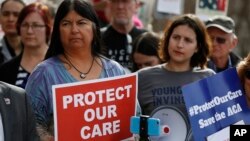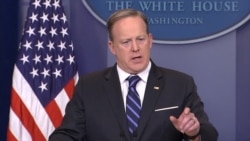U.S. President Donald Trump is dismissing protests that have broken out against his plan to dismantle national health care reforms that marked former President Barack Obama's signature legislative achievement.
Trump, in a comment on his Twitter account late Tuesday, said, "The so-called angry crowds in home districts of some Republicans are actually, in numerous cases, planned out by liberal activists. Sad!"
The White House said Wednesday that Trump would propose a new health care plan to replace the Affordable Care Act, popularly known as Obamacare, in the "next couple weeks."
During the current week-long congressional recess, numerous Republican lawmakers facing voters at town hall gatherings in their home state districts have been greeted with vocal protests against their years-long effort to scuttle the law.
Watch: White House Responds to Voter Outrage at Town Halls Across US
Some, as Trump said, have organized efforts against Republican lawmakers looking to repeal the law, while others at the town halls appear to be individual voters who are saying that they will lose their insurance, leaving them unable to pay their medical bills while facing severe health problems, if Congress doesn't approve a similar replacement measure.
Many say they want Obamacare kept much the same as it is now, with national polls showing the law is now more popular than it was when its existence was not seriously threatened in recent years.
White House spokesman Sean Spicer acknowledged that some of the protesters "are upset" at the possible loss of their health insurance, but that others are part of "manufactured protests" and said they do not reflect broad-based support in the lawmakers' congressional districts for Obamacare.
WATCH: Spicer on Town Hall fury
Repeal and replace
With a Republican in the White House who often called the law a "disaster" during his presidential campaign, a big majority of Republican lawmakers had felt they would have a clear path to repealing the law. They have assailed it since its 2010 approval by a Democratic-controlled Congress without a single Republican vote.
Republicans have repeatedly attacked one of the law's key provisions, what many conservatives have long considered an intrusive requirement that all Americans buy health care insurance, or pay a penalty to the government if they don't. Obama vetoed one repeal measure when he was in office, while Democratic lawmakers blocked dozens of other Republican repeal attempts from even reaching his White House desk for his necessary signature.
The law has allowed 20 million previously uninsured people to buy policies to help pay their medical bills, bars insurance companies from refusing to insure patients with pre-existing medical problems and allows young people to stay on their parents' insurance policies until they turn 26. Critics say the insurance policies that have been offered under the law have proven too costly for many to buy, still leaving millions of Americans uninsured.
About half of Americans get their health insurance through their employer and often would not be directly impacted by the fate of Obamacare. About a third of Americans are senior citizens and impoverished people covered by government health care programs; but, the remainder are either uninsured or have bought individual policies for themselves and their families through Obamacare and could be significantly affected if the law is repealed without an adequate replacement.
Now, even as Republican lawmakers have in Trump a like-minded opponent of Obamacare ready to sign repeal legislation, they have struggled to reach agreement on a replacement measure.
Republican revisions
Republicans uniformly want to get rid of the penalty tax provision while keeping popular parts of Obamacare, such as the provision on pre-existing medical conditions; but, Republicans and Trump have yet to figure out how to pay for a new national health care law if they eliminate the revenue-producing tax.
During his presidential campaign, Trump vowed that he would get rid of Obamacare on his first day in office.
Now he says it could take into 2018 to repeal and replace it. Congressional Republicans say they plan to act on a repeal within weeks but the legislative outcome remains uncertain, with minority Democrats vocally opposed to overturning the law.









